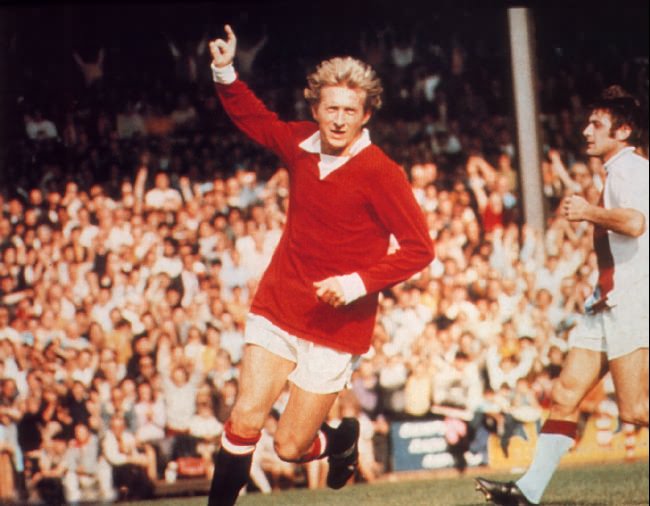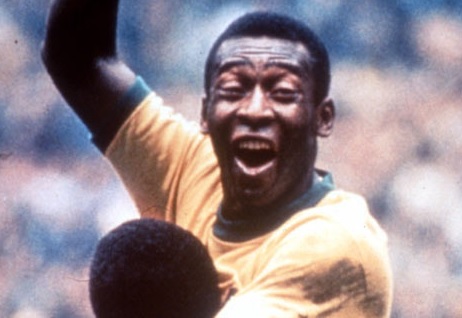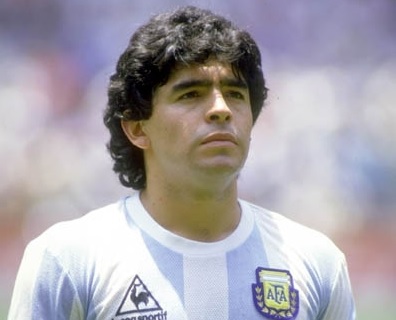Legendary Football Players: Denis Law
129. Denis Law
Denis Law (born 24 February 1940) enjoyed a long and successful career as a Scottish striker from the 1950s to the 1970s. Law's career as a football player began at Second Division Huddersfield Town in 1956. After four years at Huddersfield, Manchester City signed him for a transfer fee of £55,000, setting a new British record. Law spent one year there before Torino bought him for £110,000, this time setting a new record fee for a transfer between an English and an Italian club. Although he played well in Italy, he found it difficult to settle there and signed for Manchester United in 1962, setting another British record transfer fee of £115,000.
He is best known for the eleven years that he spent at United, where he scored 237 goals in 409 appearances and was nicknamed The King and The Lawman by supporters. He is the only Scottish player in history to have won the prestigious European Footballer of the Year award, doing so in 1964, and helped his club win the First Division in 1965 and 1967. Law left Manchester United in 1973 and returned to Manchester City for a season, then represented Scotland in the 1974 FIFA World Cup. Law played for Scotland a total of 55 times and jointly holds the Scottish international record goal tally with 30 goals. Law is also United's second highest goalscorer behind Bobby Charlton. Law holds a United record for scoring 46 goals in a single season.
In the 1954–55 season, he was spotted by Archie Beattie, a scout for Huddersfield Town, who invited him to go for a trial. When he got there, the manager said, "The boy's a freak. Never did I see a less likely football prospect — weak, puny and bespectacled." However, to Law's surprise, they signed him on 3 April 1955. While he was at Huddersfield, he had an operation to correct his squint, which greatly enhanced his self confidence. Huddersfield's relegation to what was then the Second Division made it easier for Law to get a game, and he made his debut on 24 December 1956, aged only sixteen, in a 2–0 win over Notts County. Manchester United's manager Matt Busby shortly offered Huddersfield £10,000 for Law, a substantial amount of money for a footballer at that time, but the club turned the offer down. He was not picked to play for Scotland in the 1958 FIFA World Cup, but scored on his debut against Wales on 18 October 1958 and quickly established himself as a first choice player. Bill Shankly was manager of Huddersfield between 1957 and 1959, and when he left for Liverpool he wanted to take Law with him, but Liverpool were unable to afford him at that time.
In March 1960, Law signed for Manchester City for what was then a British record transfer fee of £55,000, although Law's share of the fee was "precisely nothing". Although a First Division side, City had narrowly avoided relegation the previous season, and he genuinely felt that Huddersfield had a better team at the time. Law made his debut on 19 March, scoring in a 4–3 defeat to Leeds United. In April 1961, he scored two goals in a 4–1 win over Aston Villa that ensured City's survival in Division One Although he had thought about leaving, he was playing well and in 1961 Law scored an incredible six goals in an FA Cup tie against Luton Town. Unfortunately for him, the match was abandoned with twenty minutes to go, so his six goals didn't count. To make matters worse for him, Luton won the replay 3–1, and City were knocked out of the Cup.
He played but did not score in Scotland's match against England on 15 April 1961. Scotland lost the match 9–3, and Law described it as his "blackest day". The following November, Law represented the Football League in a match against the Italian League, losing 4–2. Although he enjoyed his time at City, he wanted to play in a more successful side and was sold to the Italian club Torino in the summer of 1961. Law's time in Italy did not go according to plan. Another Italian club, Internazionale, tried to prevent him becoming a Torino player as soon as he arrived, claiming he had signed a pre-contract agreement with them, although they dropped this claim before the season started.
Players in the UK were not treated well at the time, and the maximum wage for footballers had only recently been abolished there, so he was pleasantly surprised to find that pre-season training was based in a luxury hotel in the Alps. However, Torino took performance-related pay to something of an extreme, giving the players bags full of money when the team won but little, if anything, when they lost. Like many British footballers who have gone to play in Italy, Law did not like the style of football and found adapting to it difficult. The ultra-defensive catenaccio system was popular there at the time, so forwards did not get many chances to score. He continued to play for Scotland while he was at Torino, although the club were not keen to release him for international matches and had put a clause into his contract stating that they were not obliged to do so. On 7 February 1962, he was injured in a car crash when his teammate Joe Baker drove the wrong way around a roundabout and clipped the kerb as he tried to turn the car around, flipping it over. Baker was almost killed, but Law's injuries were not life-threatening. Law eventually signed for United on 10 July 1962, for a new British record fee of £115,000.
Law moved back to Manchester, boarding with the same landlady that he had lived with during his time as a City player. His first match for United was against West Bromwich Albion on 18 August 1962, and he made an excellent start, scoring after only seven minutes. The match finished in a 2–2 draw. However, United's form had been erratic since the Munich air disaster in 1958, and because of their inconsistency they spent the season fighting relegation. In a league match against Leicester City Law scored a hat trick but United still lost. They found form in the FA Cup though, with Law scoring another hat trick in a 5–0 win against his old club Huddersfield, and they went on to reach the final against Leicester City. Leicester were strong favourites, having finished fourth in the league, but Law scored the first goal as United won 3–1 in what turned out to be the only FA Cup final of his career. He also married his wife Diana that season, on 11 December 1962.
Law scored a number of goals early in the 1963–64 season and was selected to play for a Rest of the World side against England at Wembley, scoring their goal in a 2–1 defeat. He later described this as the greatest honour of his career. His appearance for Scotland against England at Wembley later in 1963 marked his third game that year at the stadium - all with different teams.
His season was interrupted by a 28-day suspension for a sending off that he received against Aston Villa. The unusually cold winter forced United to play many of their fixtures in a short space of time, and their results suffered. Law later blamed this for United's failure to win a trophy in that season.
In 1964–65, Law won the European Footballer of the Year award, and Manchester United won their first league title since Munich. Law's 28 league goals that season made him the First Division's top scorer. The following season, Law injured his right knee while playing for Scotland against Poland on 21 October 1965. He had previously had an operation on the same knee while at Huddersfield, and the injury was to trouble him for the rest of his career.
In 1966, Law asked United's manager Matt Busby to give him a pay rise at his next contract renewal, and threatened to leave the club if he did not get one. Busby immediately placed Law on the transfer list, announcing that "no player will hold this club to ransom, no player". When Law went to see him, Busby pulled out a written apology for him to sign, showing it to the press once he had done so. Law later claimed that Busby had used the incident to warn other players not to do the same thing, but had secretly given him the pay rise. Law scored in Scotland's famous 3–2 victory over England on 15 April 1967 in the 1967 British Home Championship, less than a year after England had become world champions. Manchester United won the league that season, but Law felt that the victory over England was even more satisfying.
In 1968, United won the European Cup for the first time, but Law's knee injury was causing him serious problems and he missed both the semi-final and the final as a result. He was regularly given cortisone injections to ease the pain, but playing while the knee was still injured was causing long-term damage. He visited a specialist in January 1968 who wrote to United claiming that a previous operation to remove the cartilage from the knee had failed and recommending that a second operation be performed, but Law was not shown the report for several years and had to continue full training.
In 1968–69, United reached the semi-final of the European Cup, playing AC Milan. United lost the first leg in the San Siro 2–0, winning the second leg at Old Trafford 1–0 with a Bobby Charlton goal. Law put the ball over the line only to see it kicked away by a Milan defender. Law claimed a goal but the referee waved play on and United went out on aggregate. Busby, who had now been knighted, resigned at the end of the season and United's decline began.
After a poor 1970–71 season, Frank O'Farrell took over as United manager. They made a good start to the 1971–72 season and finished 1971 five points clear at the top of the league, with Law having scored twelve goals. Docherty gave Law a free transfer in the summer of 1973, and he moved back to Manchester City. He played in City's 2–1 defeat in the League Cup final against Wolves. In City's last game of the 1973–74 season against Manchester United at Old Trafford, Law's back-heel gave City a 1–0 win but, thinking his goal had relegated United, he did not celebrate it (it turned out they would have been relegated even if the match had been drawn but Law did not know this at the time), walking off the pitch with his head down as he was substituted immediately afterwards. This game was the last of his professional career, as he retired shortly afterwards, not wanting to be confined to the reserve team of a City side who were bringing in younger players. Scotland reached the World Cup finals in the summer of 1974, for the first time since 1958. Although he had not played much first team football in the preceding season, Law was included in the squad and played in their first match, against Zaire. He didn't score, but Scotland won 2–0. Law was "very disappointed" not to be picked for the following match against Brazil, and was not selected for the following match against Yugoslavia either. Although Scotland were not defeated in any of their matches, they did not qualify for the second phase and were out of the World Cup.
Law still had a contract with Manchester City but their manager Tony Book told him that he would only be playing reserve team football if he stayed. He did not want to end his career in this way, so he retired from professional football in the summer of 1974. Since then, Law has often worked on radio and television summarising and presenting games.



Search My Football Facts & Stats
Web site designed & hosted by Paul Yarden © 2013 at Homestead™